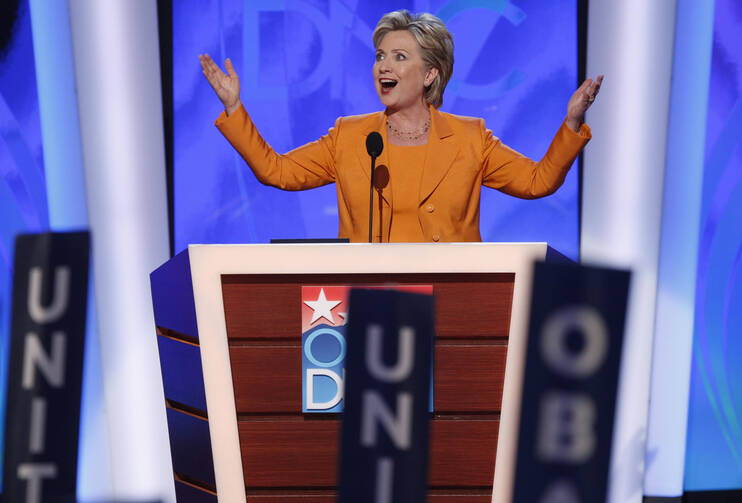It’s time to freak out about phony candidates. The Washington Post reports that looming presidential candidate Hillary Clinton “has recruited consumer marketing specialists onto her team of trusted political advisers.”
When trying to make Clinton more attractive to voters, Philip Rucker and Anne Gearan write, “no detail is too big or too small,” including “the design of the ‘H’ in her future campaign logo.” Imagine that, small-business owners and anyone with a website: putting some thought into a logo!
The Post adds some snap, crackle and pop to the story with a quote from Peter Sealey, a corporate marketing strategist: “It’s exactly the same as selling an iPhone or a soft drink or a cereal…. She needs to use everything a brand has: a dominant color, a logo, a symbol…. The symbol of McDonald’s is the golden arches. What is Clinton’s symbol?”
There’s plenty to ridicule here, but the real, unsurprising story is that the Clinton campaign has enough money to outsource this stuff to a battalion of PR experts—which doesn’t necessarily mean they won’t come up with a logo that lasts all of two weeks.
American presidential candidates have been branding themselves for centuries. In 1840, the Whig Party, whose base was in relatively prosperous and urban areas, came up with a “log cabin” image for its banners, to promote nominee William Henry Harrison as a hero for the common man. (He was actually born in a Virginia mansion and was as aristocratic as you could get in America.)
By 1960, the idea of selling a candidate like a brand of toothpaste was familiar enough for comedian Bob Newhart to spin it into one of his earliest and most famous routines, “Abe Lincoln vs. Madison Avenue” (see audio and partial transcript). Newhart’s version of Lincoln was a numbskull whose marketing expert told him what to wear (no, not earth tones), reminded him to say he was a railsplitter before he was a lawyer, and scolded him for typing his speeches. (“Abe, how many times have we told you? On the backs of envelopes. I understand it’s harder to read that way, Abe, but it looks like you wrote it on a train coming down.”)
Today, the oddest thing about Newhart’s routine is in his introduction, where he says that the “danger” of advanced marketing techniques was that, “in the presidential elections, the candidates were really getting closer and closer together. There was no real difference between them, and you were really voting for the man.”
There was some truth to that in 1960, when John F. Kennedy and Richard Nixon argued for similar policies: get tough with the commies, don’t mess too much with the post-war welfare state, move cautiously on civil rights. If you grew up between, say, 1950 and 1990, you heard a lot of adults say quite proudly that they voted for “the man, not the party”—even the ones who always voted for the same party.
The set-up to Newhart’s routine wouldn’t work today. The two major parties are as far apart on policy as they’ve ever been, and a relative handful of voters seriously consider both Democratic and Republican candidates. In an extremely close race, the branding of Hillary Clinton could make a difference, but it will be a minor factor compared with the popular perception of the Democratic Party.
There’s not much Clinton can do to change how voters feel about the Democrats. It’s still going to be Barack Obama’s party in 2016, and Clinton isn’t going to make voters in Arkansas or West Virginia forget that. The Republicans have a greater re-branding opportunity, partly because the party is now so closely identified with blocking everything Obama proposes that it’s a bit of mystery what they’ll do without a Democrat in the White House.
The New York Times’ Ross Douthat pondered this opportunity in his weekend column, pointing out that the GOP’s branding problem, at least at the presidential level, is “the fact that many persuadable voters don’t trust a Republican president to look out for their economic interests.” Jeb Bush and other potential Republican candidates are talking more about inequality these days, and even if they dismiss the “middle-class economics” agenda announced by Obama in his State of the Union speech, they recognize the need to respond to it.
Douthat doesn’t suggest that Jeb Bush, Scott Walker, et al. campaign in barn jackets and pick-up trucks; others will undoubtedly make a lot of money giving this advice. Instead, he’s waiting to see what the candidates say about tax reform and health care (i.e., coming up with a workable alternative to Obamacare). In both cases, there are trade-offs. For example, giving tax relief to middle-class families means giving a smaller tax cut, or none at all, to wealthier households—and this idea may run into a lot of resistance within the Republican Party. Douthat welcomes this kind of messy, public rebranding: “embracing reforms that deliver something tangible to middle-class voters means embracing a policy fight.But Republicans who decide to duck that fight won’t really be tackling Middle America’s biggest challenges—or their party’s biggest political problem.”
If the GOP manages to figure this challenge out, no one is going to care about the shape of the “H” in “Hillary.”








